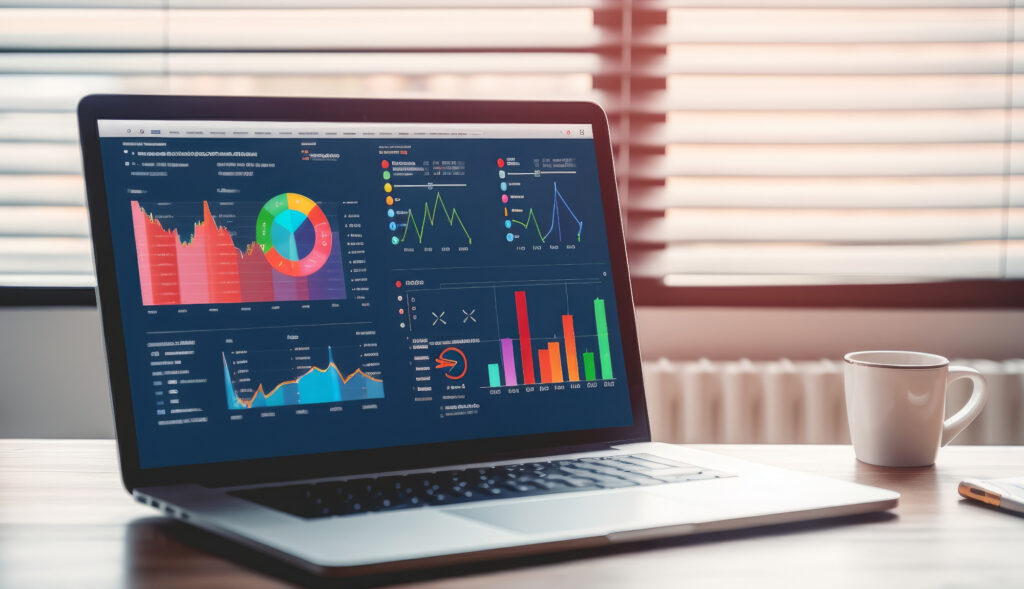In today’s data-driven environment, organizations across various sectors seek to leverage data to enhance decision-making, boost operational efficiencies, and increase their competitive edge. Business analytics software plays a pivotal role in this pursuit by providing tools and solutions that allow businesses to analyze and interpret complex data. This article will answer the question, “What is business analytics software?” and delve into its key features, types, and benefits.
What Is Business Analytics Software?
Business analytics software refers to any type of application that is designed to analyze corporate data to better understand an organization’s strengths and weaknesses. These tools use data mining, statistical analysis, and quantitative analysis to identify business opportunities and streamline operational processes. The software often integrates data from across the enterprise and provides insights that are actionable and accessible to business managers and analysts.

Key Features of Business Analytics Software
While there are several business analytics softwares to choose from, they all share a few key features, including:
Data Management: Efficient data handling capabilities ensure that data from various sources can be collected, cleaned, and integrated into a central repository.
Advanced Analytics: This includes predictive analytics and machine learning algorithms that forecast future trends and behaviors based on historical data.
Visualization Tools: Graphical representations of data, such as charts, graphs, and heat maps, make it easier for users to understand complex analytics results.
User Accessibility: Dashboards and user interfaces are designed to be intuitive, ensuring that users without a technical background can still make the most of the software’s capabilities.
Real-time Processing: This feature allows businesses to analyze and respond to data in real-time, enhancing the agility of decision-making processes.
Types of Business Analytics Software
Here are a few examples of business analytics software:
Descriptive Analytics Tools: These tools focus on summarizing raw data to make it interpretable and are often used to track key performance indicators (KPIs).
Predictive Analytics Tools: They use statistical models and forecasts to predict future events, helping businesses anticipate changes and adapt strategies accordingly.
Prescriptive Analytics Tools: These are advanced tools that not only predict but also suggest a range of prescribed actions and the likely outcome of each.

Benefits of Using Business Analytics Software
Implementing business analytic software equips companies with the tools necessary for enhanced decision-making. With accurate data analysis, businesses can make well-informed decisions that minimize risks and boost operational efficiency.
This software allows for the rapid and precise analysis of large datasets, improving the management and efficiency of business operations. Not only that, but it also provides deep insights into customer preferences and behaviors, enabling companies to tailor their products and services more effectively to meet market demands.
The optimization of business processes through analytics can lead to significant cost reductions and resource savings. By staying ahead of market trends and understanding customer needs before they become apparent, companies gain a competitive advantage. Overall, business analytics software not only offers a clearer view of a company’s performance but also provides a strategic edge in the industry.
Key Considerations for Selecting Business Analytics Software
Choosing the right business analytics software is crucial for maximizing its benefits. Here are several factors to consider:
Specific Business Needs: Determine what specific problems you need the software to solve or what goals you aim to achieve with it.
Ease of Integration: Check how well the software integrates with your existing systems to avoid data silos and ensure seamless data flow.
Scalability: Ensure that the software can scale as your business grows. It should handle increased data volumes and user loads without performance degradation.
Security Features: Given the sensitivity of business data, robust security features are essential to protect against data breaches and ensure compliance with regulations.
User-Friendliness: Choose software that is intuitive and easy to use to minimize training time and make it accessible to non-technical users.
Support and Training: Good vendor support and comprehensive training resources can significantly enhance the software’s effectiveness and user adoption.
By carefully evaluating these factors, businesses can select a business analytics software that not only fits their current needs but also supports their future growth and adaptation in the ever-evolving market landscape.
Does Your Business Need Business Analytics Software?
Deciding whether your business needs business analytics software hinges on a few key considerations. This type of software can be invaluable for businesses:
✔Aiming to improve efficiency
✔Wanting to understand customer behavior more effectively
✔Seeking to gain a competitive edge
✔Facing challenges in areas such as operational efficiency, market adaptation, and customer service
If your business seeks to leverage data for improved decision-making and strategic planning, investing in business analytics software is a wise move.
Conclusion
Business analytics software, like HUB Analytics, is an essential tool for any organization looking to harness the power of data in today’s competitive landscape. It offers financial solutions for businesses to transform raw data into insights, fostering better business decisions, optimizing operations, and enhancing customer satisfaction. By integrating such tools into their operations, businesses not only gain a clearer view of their performance but also a strategic advantage in their respective industries. Whether you’re a small enterprise or a large corporation, understanding and implementing business analytics can lead to transformative outcomes.
FAQs About Business Analytics Software
What is business analytics software?
This is any type of software application that analyzes a company’s data to shed light on its strengths and weaknesses. Business analytics software identifies business opportunities and improves operational processes through tools like data mining, quantitative analysis, and statistical analysis.
What is the difference between business analytics and business intelligence software?
Business analytics software focuses on predictive models and deep data analysis to provide future insights and trends. In contrast, business intelligence software primarily deals with the analysis of past and current data to inform current business operations and strategies.
How long does it typically take to implement business analytics software?
The implementation time can vary significantly depending on the complexity of the software and the specific business needs. It generally ranges from a few weeks to several months. Factors like data cleanliness, system integration complexity, and training requirements play a critical role in the timeline.
Can small businesses benefit from business analytics software?
Yes, small businesses can greatly benefit from business analytics software. Even with smaller data sets, the insights gained can help optimize operations, improve customer engagement, and make more informed strategic decisions.
Is there a significant maintenance requirement for business analytics software?
Like any software, business analytics platforms require regular updates and maintenance to ensure optimal performance and security. The complexity of maintenance varies with the sophistication of the software. Most vendors offer support and maintenance services as part of their packages.
What are the common challenges in using business analytics software?
Common challenges include data quality issues, integrating data from disparate sources, securing adequate training for staff, and ensuring the software remains scalable and adaptable to changing business needs.
